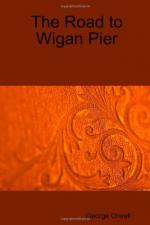
|
| Name: _________________________ | Period: ___________________ |
This test consists of 15 multiple choice questions and 5 short answer questions.
Multiple Choice Questions
1. What famous line came from Greenwood's play "Love on the Dole?"
(a) "Oh, God, let me get out of here!"
(b) "Oh God, let me die!"
(c) "Oh God, why have y ou done this to me?"
(d) "Oh God, send me some work!"
2. How did a Northerner visiting Southern England see that part of the country?
(a) As snobbish, effeminate and lazy.
(b) As snobbish, wealthy and unconcerned.
(c) As snobbish, cruel and wealthy.
(d) As snobbish, uneducated and fantastic.
3. What did Orwell find amazing about the unemployed men he met after returning from Burma?
(a) That they were ashamed of being unemployed.
(b) That they were shiftless and uneducated.
(c) That they were angry and bitter people.
(d) That they were well fed and well clothed.
4. To what did Orwell compare a "shabby-genteel family" in England?
(a) The same as a family of poor farmers in Paris.
(b) The same as a "negro" family living in Manchester.
(c) The same as a family of poor whites living in an all "negro" area.
(d) The same as a family of immigrants in the United States.
5. How did unemployment affect the life of the married man?
(a) Unemployment did not make much difference in the home.
(b) Unemployment encouraged men to do housework.
(c) Unemployment raised the crime rate.
(d) Unemployment drove men to drink.
6. Who was John Galsworthy?
(a) A playwright.
(b) A doctor.
(c) A revolutionary.
(d) A poet.
7. What did Orwell find hopeful about the unemployed men he met?
(a) They had not gone to pieces spiritually.
(b) They continued to exerecise in case work should come available in the mines.
(c) They relied on each other for food and money.
(d) They could talk about their experiences and learn from them.
8. With what, according to Orwell, is socialism inextricably connected?
(a) The idea of overthrow of the rich.
(b) The idea of workers' solidarity.
(c) The idea of machine production.
(d) The idea of better housing and working conditions.
9. Why did Orwell think the upper-middle class were drawn to India, Kenya and Nigeria?
(a) Because they could effect social change.
(b) Because they could pretend to live the life of gentlemen.
(c) Because they were considered royalty in those countries.
(d) Because they were unable to speak the language and were considered intelligent.
10. What did Orwell call "the best example of bourgeois-baiting literature?"
(a) Shakespeare's "Romeo and Juliet."
(b) Mirsky's "Intelligentsia of Great Britain."
(c) Shaw's "Major Barbara."
(d) Ionesco's "The Bald Soprano."
11. What was "the flock mattress?"
(a) A playground in Wigan that had a baseball field.
(b) A playground in Wigan that looked like a hockey arena.
(c) A playground in Wigan that looked like a bird sanctuary.
(d) A playground in Wigan that looked like a choppy sea frozen in place.
12. What percentage of a person's income, whether employed or on unemployment, was given over to rent in Wigan?
(a) One half.
(b) One fifth.
(c) One third.
(d) One fourth.
13. What common feeling was shared by all of the different factions of the middle class in England?
(a) Kindness.
(b) Hatred.
(c) Understanding.
(d) Confusion.
14. When asked who the top ten greatest men living in 1920, who was most often named in Orwell's school class?
(a) Hardy.
(b) Lennon.
(c) Trotsky.
(d) Lenin.
15. What did Orwell think was the result of efforts at reducing class distinctions in England?
(a) It mostly brought children together from all classes of society.
(b) It gave people a chance to see how the other half lived.
(c) It simply intensified prejudice.
(d) It was the reason for class warfare.
Short Answer Questions
1. Why did Orwell have the opportunity to receive an expensive public school education?
2. What did Orwell envision a home in the future?
3. Who was the typical Socialist of the late 1930's in England?
4. Why were the industrial towns in England so ugly and noxious?
5. Who did Orwell go to hear speak while he was in Sheffield?
|
This section contains 761 words (approx. 3 pages at 300 words per page) |

|




